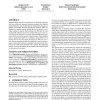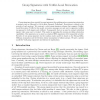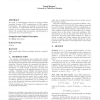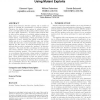CCS
2004
ACM
15 years 5 months ago
2004
ACM
102
click to vote
CCS
2004
ACM
15 years 5 months ago
2004
ACM
Magnetic stripe cards are in common use for electronic payments and cash withdrawal. Reported incidents document that criminals easily pickpocket cards or skim them by swiping the...
144
click to vote
CCS
2004
ACM
15 years 5 months ago
2004
ACM
Group signatures have recently become important for enabling privacy-preserving attestation in projects such as Microsoft's ngscb effort (formerly Palladium). Revocation is c...
123
click to vote
CCS
2004
ACM
15 years 7 months ago
2004
ACM
We study a countermeasure proposed to protect Chinese remainder theorem (CRT) computations for RSA against fault attacks. The scheme was claimed to be provably secure. However, we...
124
click to vote
CCS
2004
ACM
15 years 7 months ago
2004
ACM
Comparing the expressive power of access control models is recognized as a fundamental problem in computer security. Such comparisons are generally based on simulations between di...
108
click to vote
CCS
2004
ACM
15 years 7 months ago
2004
ACM
Payload attribution is an important problem often encountered in network forensics. Given an excerpt of a payload, finding its source and destination is useful for many security ...
113
click to vote
CCS
2004
ACM
15 years 7 months ago
2004
ACM
Misuse-based intrusion detection systems rely on models of attacks to identify the manifestation of intrusive behavior. Therefore, the ability of these systems to reliably detect ...
103
click to vote
CCS
2004
ACM
15 years 7 months ago
2004
ACM
Address-space randomization is a technique used to fortify systems against bu
er over
ow attacks. The idea is to introduce arti
cial diversity by randomizing the memory location o...
125
click to vote
CCS
2004
ACM
15 years 7 months ago
2004
ACM
Access control can be used to ensure that database queries pertaining to sensitive information are not answered. This is not enough to prevent users from learning sensitive inform...
114
click to vote
CCS
2004
ACM
15 years 7 months ago
2004
ACM
Intranet access has become an essential function for corporate users. At the same time, corporation’s security administrators have little ability to control access to corporate ...




